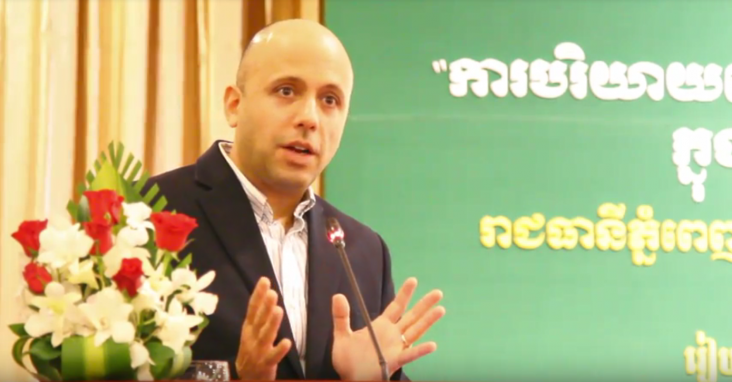Speeches Shim

(as prepared for delivery)
- Representative of the Ministry of Education
- Dr. Chhim Sotheara, Executive Director of the Transcultural Psychosocial Organization
- Mr.Tim Minea, KDK Executive Director
- Chariya Om, Project Coordinator of the Transcultural Psychosocial Organization
- Distinguished guests and colleagues
It is a great honor to be here with you today for this important event. I would like to take this opportunity to thank the Transcultural Psychosocial Organization and KDK for organizing this forum and for inviting me to say a few words.
As we all know, Cambodia has suffered through many painful years of civil war, including – but not limited to – the almost unimaginable atrocities committed under the Khmer Rouge regime. During those years, some of the darkest known to humanity, more than 1.7 million Cambodians died from starvation, forced labor, torture, and execution.
Why do these atrocities matter to us here and now in 2019? It is because there is no better teacher than the past. The effects of the Khmer Rouge regime still linger for many Cambodians who lived through that terrible period. Remembering and understanding the history of such crimes is critical not only to comprehending where we are today, but also to helping us build a better future as a nation and a society.
My interest in this subject was sparked with a field visit I took to Kep to observe TPO’s activities. It was there that I realized that atrocities committed under the Khmer Rouge have had a devastating impact on Cambodian society, particularly psychologically.
Current estimates indicate that 14.2% of Cambodian adults aged 35 and older suffer from some form of post-traumatic stress disorder – a figure nearly six times higher than that of the United States where it is 2.3%. It is estimated that intergenerational trauma, that is trauma passed on from parents to children, is widespread. Cambodians aged 35 and under – most of whom are presumably too young to remember the Khmer Rouge – also suffer from abnormally high rates of PTSD…7.9%.
As you can see, mental health needs in Cambodia are great. Addressing them will mark an important step in Cambodia’s journey to self-reliance. This is what makes TPO’s work so important. In the context I just described, promoting trauma healing for individuals and communities who experienced torture during Khmer Rouge regime is vitally important. TPO, in collaboration with Kdei Karuna Organization, are using their substantial experience to support affected individuals to access their rights and to achieve justice and healing. This project underscores the U.S. Government’s ongoing commitment to supporting transitional justice in Cambodia. We are also supporting the Documentation Center of Cambodia and the Khmer Arts Association in order to promote education, justice, memory, and healing.
I want to thank the Royal Government of Cambodia for the leadership they have shown in recognizing the importance of dealing with mental health issues that have arisen as a result of atrocities committed during the Khmer Rouge.
I am excited that today’s launch will highlight the wonderful work that TPO has been doing. I wish everyone continued success as you work to promote national reconciliation in Cambodia.
Lastly, I want to thank TPO and KDK for organizing this event.
Related Speeches
- Remarks by Menglim Kim, Project Management Specialist, USAID/Cambodia, USAID Greening Prey Lang Final Youth Debate
- Remarks by Ms. Hanh Nguyen, Deputy Mission Director USAID/Cambodia, Health Professional Councils’ Strategic Planning Orientation Workshop
- Remarks by John Eyres, Director, Office of Public Health and Education, USAID/Cambodia, Dissemination Workshop of the Fifth National Strategic Plan for a Comprehensive & Multi-sectoral Response to HIV & AIDS in Cambodia

Comment
Make a general inquiry or suggest an improvement.